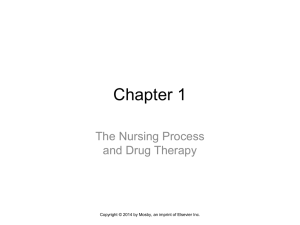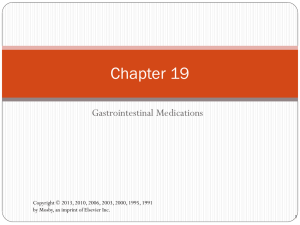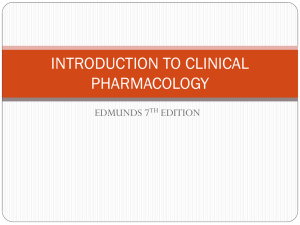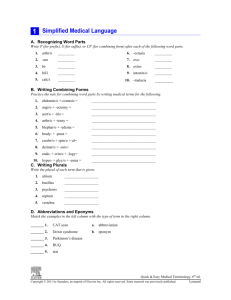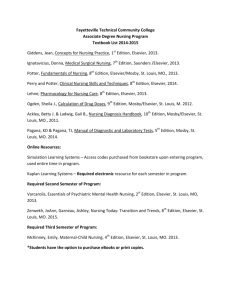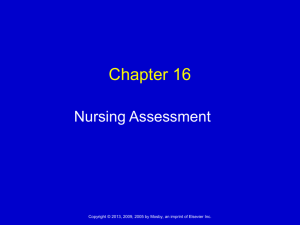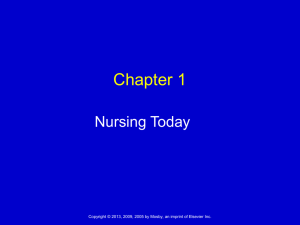Pharmacology and the Nursing Process, 4th ed. Lilley/Harrington
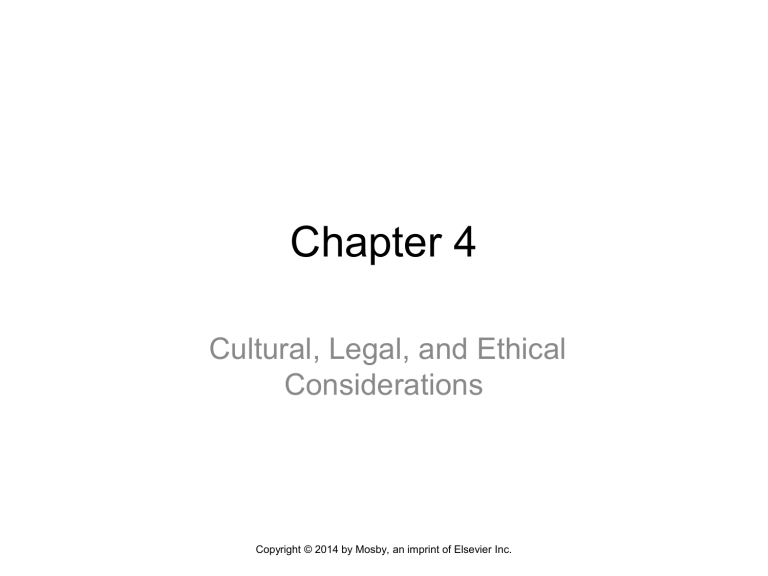
Chapter 4
Cultural, Legal, and Ethical
Considerations
Copyright © 2014 by Mosby, an imprint of Elsevier Inc.
Classroom Response Question
Which racial group is predicted to be nearly one in three
U.S. residents in 2050?
A. African American
B. Asian
C. Hispanic
D. White
Copyright © 2014 by Mosby, an imprint of Elsevier Inc.
2
Cultural Considerations
Influence of ethnicity on genetics and drug response
Drug polymorphism
Compliance level with therapy
Environmental and economic considerations
Barriers to adequate health care for culturally diverse
Copyright © 2014 by Mosby, an imprint of Elsevier Inc.
3
Cultural Assessment
Languages spoken
Health beliefs and practices
Past uses of medicine
Herbal treatments, folk remedies, home remedies
Over-the-counter drugs and treatment
Copyright © 2014 by Mosby, an imprint of Elsevier Inc.
4
Cultural Assessment (cont’d)
Usual response to illness
Responsiveness to medical treatment
Religious practices and beliefs
Support from the patient’s cultural community
Dietary habits
Copyright © 2014 by Mosby, an imprint of Elsevier Inc.
5
U.S. Drug Legislation
1906: Federal Food and Drugs Act
1912: Sherley Amendment (to the Federal Food and Drug Act of 1906)
1914: Harrison Narcotic Act
1938: Federal Food, Drug, and Cosmetic Act
(revision of 1906 act)
1951: Durham-Humphrey Amendment (to the
1938 act)
Copyright © 2014 by Mosby, an imprint of Elsevier Inc.
6
U.S. Drug Legislation (cont’d)
1962: Kefauver-Harris Amendments (to the 1938 act)
1970: Controlled Substances Act
1983: Orphan Drug Act
1996: Health Insurance Portability and
Accountability Act (HIPAA)
2003: Medicare Prescription Drug, Improvement, and Modernization Act
Copyright © 2014 by Mosby, an imprint of Elsevier Inc.
7
New Drug Development
Investigational new drug (IND) application
Informed consent
U.S. FDA drug approval process
Preclinical testing
Clinical studies
Investigational drug studies
Expedited drug approval
Copyright © 2014 by Mosby, an imprint of Elsevier Inc.
8
U.S. FDA Drug Approval Process
Preclinical investigational drug studies
Clinical phases of investigational drug studies
Phase I
Phase II
Phase III
Phase IV
Copyright © 2014 by Mosby, an imprint of Elsevier Inc.
9
Classroom Response Question
A research group is conducting an investigational drug study on a promising new drug for osteoporosis. It has been difficult to find research subjects who meet the criteria. Just before the conclusion of the study, four subjects approach the researchers and express their desire to withdraw from the study. The researcher should first
A. inform them that they waited too long to withdraw from the study.
B. explore with them the reasons for withdrawing from the study.
C. acknowledge that they can withdraw at any time from the study.
D. request that they try to remain with the study until it is completed.
Copyright © 2014 by Mosby, an imprint of Elsevier Inc.
10
Legal Nursing Considerations
State and federal legislation
Nurse practice acts
Scope of nursing practice
Expanded nursing roles
Educational requirements
Standards of care
Minimally safe nursing practice
Differences between nursing and medical practice
Copyright © 2014 by Mosby, an imprint of Elsevier Inc.
11
Legal Nursing Considerations
(cont’d)
Guidelines from professional nursing groups
Institutional policies and procedures, state and federal hospital licensing
Case law or common law
HIPAA
Copyright © 2014 by Mosby, an imprint of Elsevier Inc.
12
Ethical Considerations
American Nurses Association (ANA) Code of
Ethics for Nurses
International Council of Nurses (ICN) Code of
Ethics for Nurses
Copyright © 2014 by Mosby, an imprint of Elsevier Inc.
13
Classroom Response Question
A nurse has been asked to participate in an elective procedure that violates the nurse’s personal ethical principles. The nurse should
A. refuse to participate.
B. ask to switch assignments with another nurse.
C. speak to the manager or supervisor.
D. perform the procedure.
Copyright © 2014 by Mosby, an imprint of Elsevier Inc.
14

